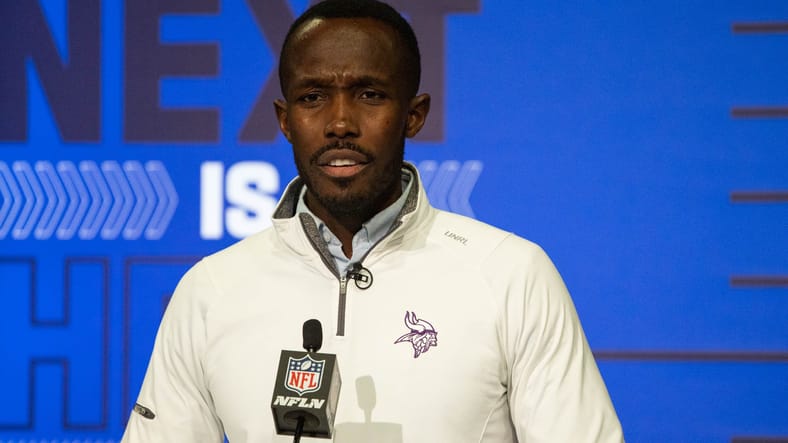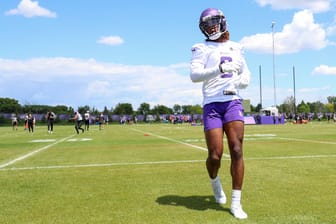Cap Space Will Remain a Concern for the Vikings in Years to Come

In recent years, the Minnesota Vikings have had to juggle some very tricky salary cap situations. For instance, the Vikings began the 2022 offseason around $15 million over the salary cap when it was announced to be set at $208.2 million for this upcoming season. With some fancy maneuvering to some deals, including those of Kirk Cousins and Danielle Hunter. After moving this money around, it might be easy to think that Minnesota is out of the woods.
In fact, there are those out there that believe the Vikings are in a healthy spot regarding their salary cap. The linked article was put together by our editor, Kyle Joudry, in which he reacts to Brad Spielberger’s statements about the Vikings. Here is what Spielberger had to say:
A new regime in Minnesota largely maintained the status quo this offseason, but to their credit, the Vikings didn’t do anything to jeopardize their ability to revamp this roster long-term. A complete teardown was sought by many, and still may prove to have been the better approach, but with a weak NFC North and NFC at large, it shouldn’t come as a total surprise that they elected to take at least one more shot with this nucleus of players.
Most importantly, Kirk Cousins‘ one-year extension was effectively just proactively franchise-tagging a player who cannot realistically be franchise-tagged again in his career after receiving two tags from the Washington Commanders. Cousins’ one-year, $35 million extension leaves the door open for a trade after the 2022 season if Minnesota elects to finally move on and start fresh.
[…]
Long story short, absent a total rebuild, this was probably the smartest way for the Vikings to approach the offseason, as they bought themselves time to let things play out and allow their 2022 results to choose a direction for them.
This is all well and good, but there is one piece here that Spielberger seems to be missing: Kirk Cousins isn’t going anywhere next offseason, and that seems to be what he is banking on for Minnesota. Currently per Over The Cap, the Vikings cap space in 2023 is a miniscule $1.8 million below the projected $225 million. Over the course of this winter, Cousins repeatedly stated his wishes to retire as a Viking. This possibility became part of his new contract extension in a no-trade clause.
[brid autoplay=”true” video=”1041644″ player=”26281″ title=”Where%20the%20Purple%20Money%20Goes” duration=”932″ description=”Dustin Baker explains the Vikings salary cap allocation by NFL ranking.” uploaddate=”2022-06-27″ thumbnailurl=”https://cdn.brid.tv/live/partners/19439/snapshot/1041644_th_1656350692.jpg” contentUrl=”//cdn.brid.tv/live/partners/19439/sd/1041644.mp4″ width=”16″ height=”9″]
The new extension for Cousins freed up space for 2022, but the QB still carries a large cap hit of $36.2 million in 2023, more than 16% of the projected cap. On top of that, there are three other players currently carrying cap hits of nearly $20 million in 2023: Adam Thielen, Brian O’Neill, and Harrison Smith. The Minnesota Vikings are supposed to be offering Justin Jefferson a massive contract extension next year in order to keep him off the free agency market for the foreseeable future. However, that becomes a lot more difficult when there are so many players carrying such high cap hits. The cuatro of Cousins, O’Neill, Smith, and Thielen account for roughly 42% of the estimated 2023 salary cap.
Even if Minnesota is able to get a deal done with Jefferson, that only means the Vikings will continue juggling cap space throughout that contract. The deal should be one of the most, if not the single most lucrative deals a wide receiver has ever inked.
Of course, there are worse things to worry about as a fan base than one of the best young receivers in NFL history getting paid massive amounts of money. However, it’s worth stating that this offseason was likely not the last time that Minnesota will have to revisit the finances in their quest for a Super Bowl title.

Vikings Secondary Labeled as “Ascending”
